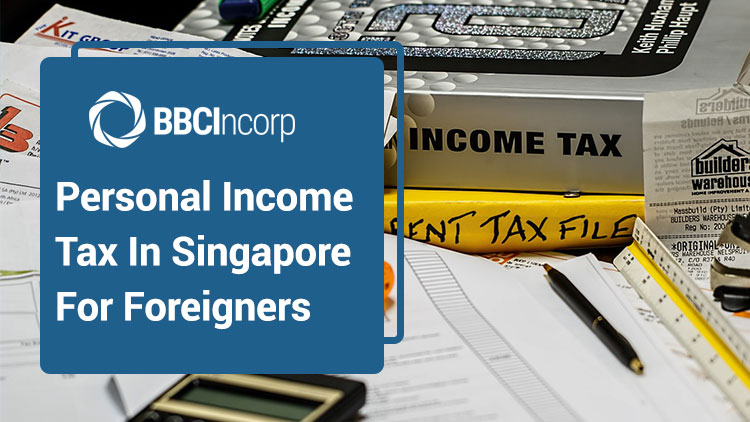
Personal income tax is one of the most fundamental in the Singapore tax system. If you are a foreigner working day in and day out in Singapore, chances are personal income tax may apply to you.
This form of tax could get complex at times since it depends largely on your residency status. Let’s now dive deeper into how personal income tax applies to a foreigner like you as well as some tips and pointers to help you reduce the amount you have to pay.
1. Overview of Personal Income Tax in Singapore for Foreigners
All income earned in or derived from Singapore is chargeable to income tax in this nation.
Income that is earned overseas when collected in Singapore would not be subject to personal tax, except the following circumstances:
- It is received through partnerships in Singapore
- Your overseas employment is incidental to your Singapore employment (you have to travel outside of Singapore as a part of your job requirement)
- You work overseas on behalf of Singapore government
- You have a trade or business in Singapore and you are carrying on a trade/business overseas which is incidental to your Singapore trade (you may apply for double taxation relief)
Income that is exempted from Personal income tax in Singapore
- In Singapore, capital gains, dividend income, interests, and inheritance are wholly exempted from personal income tax.
- Capital gains such as the sale of fixed assets, stocks, bonds or intangible assets are not taxed. However, gains from sales of properties might be taxed if it is deemed to be trading in properties.
- Dividend income derived from dividends issued by a company in Singapore, and under certain conditions, Malaysia and Hong Kong as well, are not subject to tax
- Interest earned from approved banks, licensed financial institutions or debt securities not derived from a partnership is not taxable
- Inheritance is not taxed as Singapore has long eliminated inheritance tax on the money or property of someone who has passed away
2. Rates for Personal Income Tax in Singapore for Foreigners
Essentially, the tax rate imposed on personal income for both foreigners and locals will be determined based on the tax residency status, regardless nationalities. With that being said, for tax purposes, there are 2 types status:
- Tax resident
- Non-tax resident.
2.1. Personal Income Tax Rate for Tax Resident in Singapore
You are considered a tax resident in Singapore if you fall under any of the following categories:
- Singapore citizens
- Singapore permanent residents
- Any foreigner who is physically present in Singapore for no less than 183 days
To get a better idea of how tax residency status is assessed, have a look at this table:
| How long do you stay in Singapore? | Are you a tax resident? |
|---|---|
| At least 183 days for a year | Yes |
| At least 183 days for a continuous period over two years | Yes, for both years |
| 3 consecutive years | Yes, for all three years |
Singapore adopts a progressive approach to personal income tax rates for tax-residents, described as follows:
| Chargeable income | Tax rate | Gross tax payable |
|---|---|---|
| First $20,000 Next $10,000 | 0% 2% | 0 $200 |
| First $30,000 Next $10,000 | – 3.5% | $200 $350 |
| First $40,000 Next $40,000 | – 7% | $550 $2,800 |
| First $80,000 Next $40,000 | – 11.5% | $3,350 $4,600 |
| First $120,000 Next $40,000 | – 15% | $7,950 $6,000 |
| First $160,000 Next $40,000 | – 18% | $13,950 $7,200 |
| First $200,000 Next $40,000 | – 19% | $21,150 $7,600 |
| First $240,000 Next $40,000 | – 19.5% | $28,750 $7,800 |
| First $280,000 Next $40,000 | – 20% | $36,550 $8,000 |
| First $320,000 Beyond $320,000 | – 22% | $44,550 |
For example, if one earns $40,000/month then the payable tax is [(20,000 x 0%) + (10,000 x 2%) + (10,000 x 3.5%)] = $550/month.
2.2. Personal Income Tax Rate for Non-Tax Resident in Singapore
If your physical presence in Singapore is less than 183 days, then you qualify as a non-resident. The tax rates applied to the personal employment income of a non-resident are described as follows:
| Days of presence | Tax rate |
|---|---|
| No more than 60 days | 0% except for:
|
| From 61 days to 182 days |
Whichever results in a higher tax amount. |
Regarding non-resident directors, non-resident professionals and non-resident public entertainers, the tax rates are imposed as follows:
| Group | Tax rate |
|---|---|
| Non-resident Directors | 22% on remuneration |
| Non-resident Public entertainers | 10% (or 15% from April 2022) on income |
| Non-resident Professionals | 15% on gross income or 22% on net income |
3. How to File Personal Tax Income in Singapore for Foreigners
Being a taxpayer, you are obliged to file your own tax return every year once received a notification letter from IRAS. The annual deadline for submission is:
- The 15th of April for paper-based filing
- The 18th of April for e-filing
You have to file your income tax return no matter how much income you earned the preceding year. However, you can be exempted from filing duty only if you receive a notification of selection for the No-Filing Service.
There are two ways to file your returns, either online or by mail. Depending on your status, IRAS will send you an appropriate tax form, which is one of the following:
- Form B1 if you are a tax resident
- Form B if you are self-employed
- Form M if you are non-resident
You should make sure that the return is filed in a timely manner. Any failure to do so sure will result in penalties or even prosecution.
Upon submission, you should expect a Notice of Assessment or a tax bill specifying the amount of tax you need to pay at some time between May and September. The deadline for paying this amount is within 30 days from the receipt of the notice.
You are allowed to lodge an appeal with IRAS if their assessment does not sit well with you. You are given 30 days from the date you received the notice to do so. The appeal should also detail the reason for your objections.
4. How to Reduce Personal Tax Income in Singapore
Aside from having one of the lowest tax rates in the world, Singapore also offers a wide array of favorable tax incentives and tax reliefs. If you can leverage these schemes, your effective payable tax would appear much lower.
Some typical tax relief for tax residents in Singapore are:
- Course fee relief
- Earned income relief
- Life insurance relief
- SRS relief
- CPF cash top-up relief
- CPF relief
- NSman (self) relief
- Handicapped brother/sister relief
- Parent/handicapped parent relief
Some typical schemes that both tax residents and non-tax residents can make use of:
- Deductions on employment expenses
- Deduction on donations
- Deduction on rental expenses
- Deductions for sole-proprietors, self-employed person and partners
- Not Ordinarily Resident Scheme
- Area Representative Scheme
Learn more: How to Reduce Personal Income Tax in Singapore
5. Key takeaways
Below are some crucial main points on personal income tax in Singapore for foreigners:
- Personal income tax in Singapore is based on residency status (tax resident and non-tax resident)
- Tax residents are taxed based on a progressive basis, from 0% to 22%.
- Non-tax residents will be taxed with the rate of 15% or progressive tax rates (whichever results in a higher amount) if physically being in Singapore from 61 to 182 days. Below 61 days, they will be taxed at 0% (except for directors, professionals and public entertainers).
- Taxpayers are obliged to file tax return every year regardless of how much income they earned in the preceding year.
- There are many legal ways to reduce personal income tax in Singapore for individual taxpayers.
Should you have any questions regarding Singapore income tax for foreigners, talk to our consultants by dropping a chat message or sending us an email via service@bbcincorp.com
Disclaimer
While BBCIncorp strives to make the information on this website as timely and accurate as possible, the information itself is for reference purposes only. BBCIncorp would like to inform readers that we make no representation or warranty, express or implied. Feel free to contact BCCIncorp’s customer services for advice on specific cases.
Get helpful tips and info from our newsletter!
Stay in the know and be empowered with our strategic how-tos, resources, and guidelines.


